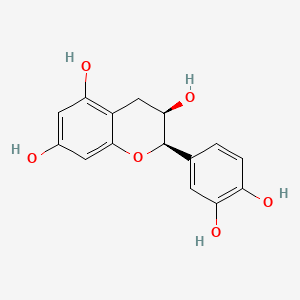| Authors | Title | Published | Journal | PubMed Link |
|---|---|---|---|---|
| pmid: | ||||
| McLean AE and Nuttall L | Paracetamol injury to rat liver slices, and its subsequent prevention by some anti-oxidants. | 1976 | Biochem. Soc. Trans. | pmid:1001736 |
| Katiyar SK et al. | Polyphenolic antioxidant (-)-epigallocatechin-3-gallate from green tea reduces UVB-induced inflammatory responses and infiltration of leukocytes in human skin. | 1999 | Photochem. Photobiol. | pmid:10048310 |
| Friedrich H and Wiedemeyer H | [Quantitative determination of the tannin-precursors and the tannins in Ephedra helvetica (author's transl)]. | 1976 | Planta Med. | pmid:1005523 |
| Facino RM et al. | Diet enriched with procyanidins enhances antioxidant activity and reduces myocardial post-ischaemic damage in rats. | 1999 | Life Sci. | pmid:10069526 |
| Dvorakova K et al. | Pharmacokinetics of the green tea derivative, EGCG, by the topical route of administration in mouse and human skin. | 1999 | Cancer Chemother. Pharmacol. | pmid:10071985 |
| Chen W et al. | Inhibition of ultraviolet B--induced c-fos gene expression and p38 mitogen-activated protein kinase activation by (-)-epigallocatechin gallate in a human keratinocyte cell line. | 1999 | Mol. Carcinog. | pmid:10078934 |
| Lin YL et al. | Theaflavin-3,3'-digallate from black tea blocks the nitric oxide synthase by down-regulating the activation of NF-kappaB in macrophages. | 1999 | Eur. J. Pharmacol. | pmid:10079014 |
| Guo Q et al. | ESR study on the structure-antioxidant activity relationship of tea catechins and their epimers. | 1999 | Biochim. Biophys. Acta | pmid:10082983 |
| Kim SU et al. | Inhibition of chitin synthase II by catechins from stem bark of Taxus cuspidata. | 1999 | Planta Med. | pmid:10083852 |
| Takahashi T et al. | Procyanidin oligomers selectively and intensively promote proliferation of mouse hair epithelial cells in vitro and activate hair follicle growth in vivo. | 1999 | J. Invest. Dermatol. | pmid:10084307 |
| Meckes M et al. | Antiprotozoal properties of Helianthemum glomeratum. | 1999 | Phytother Res | pmid:10190180 |
| Okushio K et al. | Methylation of tea catechins by rat liver homogenates. | 1999 | Biosci. Biotechnol. Biochem. | pmid:10192923 |
| Ahn HY et al. | Epigallocathechin-3 gallate selectively inhibits the PDGF-BB-induced intracellular signaling transduction pathway in vascular smooth muscle cells and inhibits transformation of sis-transfected NIH 3T3 fibroblasts and human glioblastoma cells (A172). | 1999 | Mol. Biol. Cell | pmid:10198059 |
| Cao Y and Cao R | Angiogenesis inhibited by drinking tea. | 1999 | Nature | pmid:10201368 |
| van het Hof KH et al. | Plasma and lipoprotein levels of tea catechins following repeated tea consumption. | 1999 | Proc. Soc. Exp. Biol. Med. | pmid:10202389 |
| Fujiki H et al. | Mechanistic findings of green tea as cancer preventive for humans. | 1999 | Proc. Soc. Exp. Biol. Med. | pmid:10202393 |
| Conney AH et al. | Inhibitory effect of green and black tea on tumor growth. | 1999 | Proc. Soc. Exp. Biol. Med. | pmid:10202394 |
| Swiercz R et al. | Angiostatic activity of synthetic inhibitors of urokinase type plasminogen activator. | 1999 May-Jun | Oncol. Rep. | pmid:10203585 |
| Valcic S et al. | Antioxidant chemistry of green tea catechins. Identification of products of the reaction of (-)-epigallocatechin gallate with peroxyl radicals. | 1999 | Chem. Res. Toxicol. | pmid:10207128 |
(-)-Epicatechin
(-)-Epicatechin is a lipid of Polyketides (PK) class.
